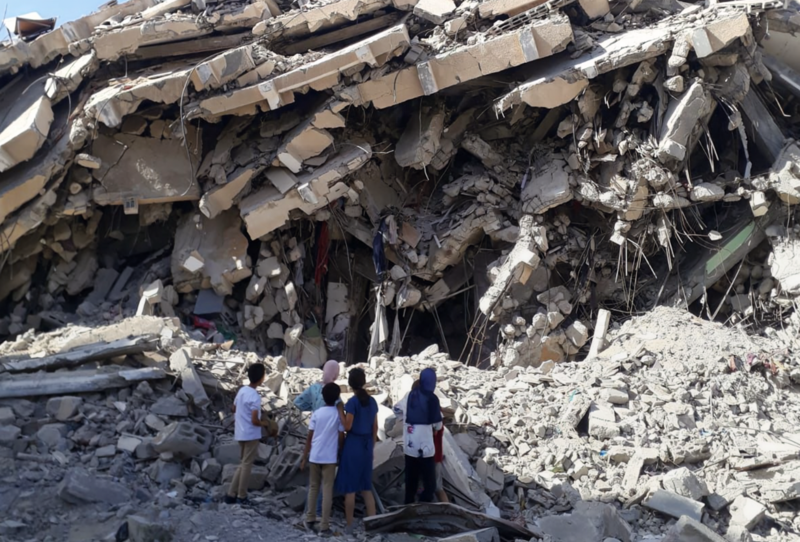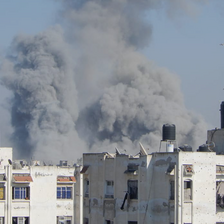The Electronic Intifada 14 October 2024

Five children gaze at the ruins of what was once their home in al-Farra Tower in Khan Younis.
The Electronic IntifadaThis is the story of my friend Reema Al-Mgair and her family – as told to me by her sister Malak – and their resilience during the Israeli-perpetrated genocide:
My family and I were living in Hamad Town residential complex in Khan Younis in March after being displaced in Rafah for two and a half months.
On the night of Saturday, 2 March, the all-too-familiar loud sounds of rocket explosions could be heard.
We had gotten used to them, and thank God, we were settled in our apartment.
Around 10:30 pm, the sounds were much louder, and the explosions from rockets and artillery shells seemed to be coming almost nonstop.
As screaming and the noise of buildings collapsing could be heard, questions came like machine-gun fire:
Is this the bombing of A8 tower?
Will our tower’s turn come?
What do we do?
Do we get out of the tower or stay where we are?
Looking to family and God for comfort
A state of panic hit us as we all gathered in the kitchen, believing it was the safest corner of the apartment from Israeli artillery shells.
We sat down to repeat the shahada, the Muslim profession of faith. We looked at each other’s faces and continued.
Then came the news of tanks in Nakheel street in Hamad Town.
We tried to reassure each other that these were just rumors. How could the Israeli army have arrived here so quickly?
But inside each one of us was a certain recognition that the tanks were indeed getting closer.
As the explosions continued, we stayed where we were until 8 the next morning when calm prevailed for a few minutes. We hoped things would return to their normal state, but the movements of large groups of people carrying a white flag indicated that was an impossibility.
Despite the fear and the panicked state we were in, we all believed we still had time to decide our next move, knowing it would not be easy for us to leave our apartment, which we had stayed in for only 18 days since our return from Rafah.
But then one of us spotted an Israeli tank pointed in our direction. It was bigger and more menacing than imagined.
Another displacement looms
We quickly got up and prepared our bags for displacement.
We prayed and went out, also carrying a white flag.
We walked for about 20 minutes. On the road, we saw five tanks, some directing their cannons at us.
We were walking with heavy steps, each of us repeating: “I bear witness that there is no God but Allah, and Muhammad is the messenger of Allah.”
We finally arrived at the gathering of people at the checkpoint, carrying our bags and waiting for our turn to pass through.
We were joined by other women, the elderly, men and youth, the sick, even birds and chickens.
Our group advanced from time to time whenever the Israeli soldiers signaled us to move forward until suddenly people began to turn around and go the other way, in compliance with the army’s orders.
We thanked God that we were not being displaced.
We passed the tanks again, and the soldiers inside them pointed their guns at us.
When we reached our apartment, we ate a few bites to support ourselves, and we all went to sleep.
It had been an exhausting day.
But it wasn’t over.
The news broadcasts said, “Tanks are penetrating the city. The tanks are located opposite the C-package towers. They are now opposite the B beam towers.”
We had developed a slight sense of security, thinking that the Israeli forces outside were the ones who told us to return to the city, which meant that they would not harm the residents.
This was our belief, perhaps just to reassure ourselves.
Minutes later, the glass of the balcony door shattered and the window was damaged.
At exactly 1:30 am the next day, a tank was directly in front of our tower, running over everything in front of it, including trees.
Around 3 am that Monday morning, a few others and I fell asleep for a brief period, but my mother remained awake.
She woke me up a while later, saying in a trembling voice that soldiers were in the house.
I took my place next to her when two soldiers entered and one of them said: “Get up, the Israeli military is here,” as they pointed their weapons at us.
Terrifying moments
Two soldiers were with my sister Reema and two were with my brother Abood. More than five soldiers were with my father, one of whom was placing his weapon in the middle of my father’s forehead. Another was doing the same with my brother Muhammad. More than 30 Israeli soldiers were in the apartment.
They took us all out to the living room, the women on one side and the men on the other.
The men were searched. Some were asked about their phones.
The soldiers led the other tenants in the building to our apartment.
Everyone was silent. We did not know what would happen to us.
Will they kill us all?
Will we be human shields?
Will they torture the men?
More and more questions went through our heads.
We could not see the Israeli soldiers’ faces due to the darkness.
They were searching everything in front of them with the help of a dog.
We were told to go to the apartment opposite ours, which overlooked the Israeli tanks and vehicles parked outside.
They blindfolded the men and tied their hands.
The sun rose and dawn broke.
At 8 am on Monday, we heard a quadcopter’s loudspeakers declare: “Hamad is a dangerous combat zone,” telling people to go to Deir al-Balah.
We could hear the voices of people gathering and leaving our community while Israeli soldiers spread out in our apartment.
We stayed like this until 11 am.
They took the men’s data and ID numbers, then returned minutes later.
Two families were allowed to leave.
The Israeli soldiers wanted my father to help them bring people down from the neighboring towers and then they said they would allow us to leave.
We continued to wait and wait. At 3 pm we were told we would be detained for another night.
Our fears increased that we would be used as human shields. A tank made terrifying sounds as it circled our tower.
Powerful random shells struck, while bulldozers and other equipment swept away homes all around us. Bursts of bullets were getting closer and louder as time passed.
At 6 pm we were ordered to sleep, forbidden to sit or raise our heads. Everyone in our group was lying on his or her back, staring with frightened eyes.
In our minds, we asked: Will we survive?
The voice of a man in the opposite apartment grew louder as he screamed in agony.
We heard the angry sounds of more soldiers entering the tower.
As for the soldiers around us, they pointed their weapons at us until a captain came forward and spoke in Arabic.
He angrily insisted to his team of soldiers, “Hamas is here! Hamas is here!”
Time was moving slowly
But dawn did finally come.
Freedom’s hope beckons
The Israeli captain came to tell us that we would be held for two or three more days.
Our hearts were filled with fear and despair.
Then he came back a few minutes later and announced that we could leave.
The Israeli soldiers did not allow us to take anything from our apartment building, which we later discovered they turned into a military barracks.
We left with our souls, walking alone in the mostly deserted streets of the city.
We raised our white flag and headed to the unknown.
Donya Ahmad Abu Sitta is a writer in Gaza.





